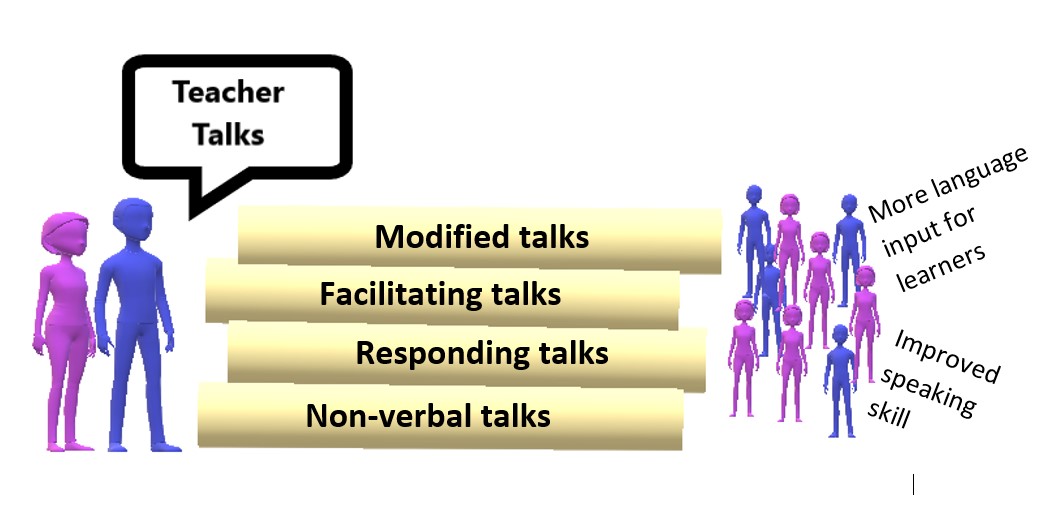Teacher talks and their importance for EFL learners
DOI:
https://doi.org/10.21070/jees.v7i2.1652Keywords:
teachers talk of English as a Foreign Language, benefit of teacher talk, forms of teacher talkAbstract
In the learning process, the teacher talk is critical because it can help the success of the learning process, especially in mastering English as a foreign language (EFL) at various levels of education. This narrative review aims to determine the form of teacher talk and its importance to EFL learners at different educational levels. This study uses secondary data from 13 journal articles, which are research results on English teacher talk from various levels of education and settings and published between 2010-2020. The articles were accessed through several databases available to the researchers. All data were synthesized based on two research questions. The results of this study were the discovery of 4 categories of teacher talk forms based on (1) speech modification to facilitate learners, (2) the teacher's role as a facilitator, (3) responses to learners, and (4) their attitude in the classroom. Teacher talk is important because it can provide correct language input to learners. This narrative review can provide new insights to EFL teachers at all levels of education regarding the forms of teacher talk that they can use and how the talks can help the learning process and outcomes.
HIGHLIGHTS:
- Teacher talk can be disseminated in the forms of speech modification to facilitate learners, teachers’ role as a facilitator, responses to learners, and teachers’ attitude in the classroom.
- Teacher talk is important because it can provide correct language input to learners and help them develop and improve their ability to speak English.
- The forms and benefits of the teacher talk cover any level of education contexts.
Downloads
References
Aisah, E. E. & Hidayat, D. R. (2010). Teacher talk on expanding ESL primary classroom discourse (A case study in an International school in Bandung). The New English Teacher, 6(1), pp. 1-3.
Aisyah, N. (2016). An analysis of teachers' talk in an EFL classroom. Journal of English and Education, 4(2), pp. 63-79.
Al-Ghamdi, H. & Al-Bargi, A. (2017). The impact of teacher speech modification on the quality of interaction and learning: An analysis of spoken discourse in Saudi EFL classrooms. International Journal of Linguistic, 9(3), pp. 1948-5425.
Basra, S. M. & Thoyyibah, L. (2017). A speech act analysis of teacher talk in an EFL classroom. International Journal of Education, 10(1), pp. 73-81.
Chu, C. P. (2014). Supporting new arrival students’ engagement with picture books: Analysis of teacher talk using the appraisal theory. Chu Functional Linguistics, 1(12), pp. 1-17.
Colle, A. T. L. A. & Fitriati, S. W. (2019). Realization of actional and formulaic competence in teachers' talk in English language class. English Educational Journal, 9(1), pp. 41-55.
Cook, V. & Singleton, D. (2014). Key topics in second language acquisition. Bristol: Multilingual Matters.
Directorate General of Nation Export Developement, 2011. Indonesia dan Perdagangan Bebas. [Online] Available http://djpen.kemendag.go.id/app_frontend/contents/146-indonesia-dan-perdagangan-bebas
Incecay, G. (2010). The role of teacher talk in young learners’ language process. Procedia Social and Behavioral Sciences, 2, pp. 277-281.
Kim, N. (2016). Critical teacher talk: Successful English for academic purposes classroom practices in a global campus. Journal of International Students, 6(4), pp. 967-983.
Meng, X., & Wang, X. (2011). Action study of teacher's language on EFL classroom interaction. Theory and Practice in Language Studies, 1(1), 98-104. doi:10.4304/tpls.1.1.98-104
Nasir, C., Yusuf, Y. Q., & Wardana, A. (2019). A qualitative study of teacher talk in an EFL classroom interaction in Aceh Tengah, Indonesia. Indonesian Journal of Applied Linguistics, 8, 525-535. doi:10.17509/ijal.v8i3.15251
Poorebrahim, F., Talebinejad, M. R. & Mazlum, F. (2015). Constructive or obstructive features of teacher talk in Iranian EFL classes. Theory and Practice in Language Studies, 5(4), pp. 729-736.
Rezaee, M. & Farahian, M. (2012). An exploration of discourse in an EFL classroom: Teacher talk. Procedia Social and Behavioral Sciences, 47, pp. 1237-1241.
Rukmana, H. F., Suryadi, S. & Diani, I. (2017). Tindak tutur guru dalam pembelajaran Bahasa Indonesia di kelas VII Tunaghrahita SMPLB Dharma Wanita Persatuan Provinsi Bengkulu. Jurnal Ilmiah KORPUS, 1(1), pp. 58-67.
Sadhegi, B., Ansari, F. J., & Rahmani, R. (2015). The effect of teacher talk on EFL learners' language learning performance, and learning strategy use. International Journal of Language Learning and Applied Linguistics World (IJLLALW), 8(2).
Sagita, I. (2018). Teacher talk and learner talk in the classroom interaction (An interaction analysis to an English language class at SMP N 2 Sindang). Wiralodra English Journal, 2(1), pp. 98-106.
Saville-Troike, M. (2006). Introducing second language acquisition. New York: Cambridge University Press.
Setiawati, L., 2012. A descriptive study on the teacher talk at EYL classroom. Indonesian Journal of Applied Linguistics, 1(2), pp. 33-48.
Shamsipour, A. & Allami, H. (2012). Teacher talk and learner involvement in EFL classroom: The case of Iranian setting. Theory and Practice in Language Studies, 2(11), pp. 2262-2268.
Syarifudin, A. (2012). Analisis tuturan guru dalam interaksi belajar mengajar pada kelas V SDN Sumbersari 1. Skripsi Jurusan Sastra-Fakultas Sastra UM.
Ünel, A. (2015). Lexical modifications in teacher talk of native speakers of English and Non-Native speakers of English in EFL classroom. International Journal of Arts & Sciences, 8(6), pp. 293-306.
Yanfen, L. & Yuqin, Z. (2010). A study of teacher talk in interactions in English classes. Chinese Journal of Applied Linguistics (Bimonthly), 33(2), pp. 76-86.
Zhang, P., 2012. Interactive patterns and teacher talk features in an EFL reading class in a Chinese University-A case study with communicative teaching method. Theory and Practice in Language Studies, 2(5), pp. 980-988.

Published
How to Cite
Issue
Section
License
Copyright (c) 2022 Yan Nisa Intan Sistyawan, Intan Izza Purnamasari, Wafiq Azizah, Arifah Mardiningrum

This work is licensed under a Creative Commons Attribution 4.0 International License.







